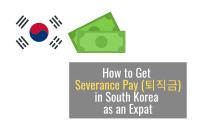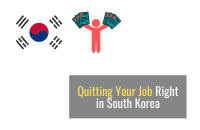Are you working in Korea?
Then, you’re probably eligible for 4 major insurances (4대보험).
These are automatically deducted from your salary each month.
Here’s what they mean and how much they cost!

Quick Summary
- Most employees in Korea are eligible for 4 public insurances.
- Only daily workers who work for less than 1 month, or freelancers who work less than 60 hours a month are not eligible for these.
- If you’re working as a full-time employee, these 4 insurances are automatically deducted from your salary and the details should be included in your pay stub. This is true for English teachers too!
1. National Pension (국민연금)
National pension is a social security system people receive after the age of 65. It’s compulsory for Korean residents (18-60 years old). Foreigners can also receive all pension benefits if they meet the requirements.
It’s like a withholding tax from your income. The total national pension is 9% of monthly income, and the company (employer) pays 4.5%, and the employee (you) pays the other half.
Pro Tip! When a foreigner with national pension is returning to their home country (including after they’ve already returned), they can get a lump sum refund. Make sure to get this as well as severance pay (퇴직금).
How Much You Pay for National Pension: Your Monthly Salary x 4.5%
2. Health Insurance (건강보험)
Health insurance is also mandatory after living in Korea for six months as it reduces medical expenses. It’s provided by the National Health Insurance Service (NHIS). Once you have health insurance, you can get the same benefits as Korean citizens when going to a hospital or pharmacy (for prescribed medicine).
Pro Tip! You can get a basic medical checkup for free every other year with this insurance, and dental scaling (cleaning) for 10,000 won every year.
As of 2021, health insurance is 6.86% of monthly income, split fifty-fifty by employer and employee.
How Much You Pay for Health Insurance: Your Monthly Salary x 3.43%
Long-term care insurance (장기요양보험) takes care of the elderly to reduce the burden on individuals and households. It’s included in this category, and is 11.52% of your health insurance premium.
How Much You Pay for Long-term Care Insurance: Health Insurance Premium x 5.76%
3. Employment Insurance (고용보험)
Employment Insurance provides unemployment checks to support you during unemployment, and job training to facilitate re-employment.
Both employer and employee pay 0.8% each for unemployment checks. Only the employer pays for the vocational competency development courses (job training that costs them 0.25% to 0.85% depending on the size of your company).
In order to receive an unemployment check, you need to
- be a subscriber of employment insurance
- have worked for at least 180 days over the past 18 months
- be within 1 year of unemployment
- be dismissed for a justifiable reason (involuntary), such as retirement, layoff or termination
- have proof of active re-employment attempts (at least 2 job seeking activities), such as emails
Pro Tip! As a job seeking benefit (구직급여), you can get 60% of your average daily wage* (of the last 3 months before dismissal) for 120 days to 270 days depending on the subscription period.
[*Average daily wage = Salary for the last 3 months / Working period for the last 3 months]
Maximum daily wage is 66,000 won and minimum is 60,120 won.
For example, the minimum check you can get is 7,214,400 won.
How Much You Pay for Employment Insurance: Your Monthly Salary x 0.8%
4. Industrial Accident Compensation Insurance (산재보험)
Industrial Accident Compensation Insurance is a compulsory insurance to protect workers and their families who suffer from industrial accidents.
The government collects a prescribed premium from employers and compensates industrially injured workers on behalf of the them with the fund (finance).
Therefore, only your employer needs to pay for this insurance. The insurance premium rate varies depending on the type of business, ranging from 0.7% to 18.6%.
How Much You Pay for Industrial Accident Compensation Insurance: Nothing
For Freelancers and Business Owners
If you’re working as a freelancer, as in you receive salary with a 3.3% withholding tax (원천징수) deducted, or if you’re a business owner, you need to pay national pension and health insurance on your own as a local subscriber (지역가입자).
Also, you need to file income taxes (종합소득세) in May.
Pro Tip! When you leave Korea for longer than a month, but plan to return, you can pause health insurance payments while you’re away. All you need to do is call them 2-3 days after leaving the country. Once you’re back in Korea, call them again to resume coverage.
FAQ
Can foreigners get health insurance in South Korea?
Yes, and it’s mandatory after living in the country for 6 months.
Why is Korean health care and insurance so cheap?
The government limits how much can be charged for each procedure.
Does Korea have private health insurance?
Yes, and many people choose to purchase better coverage.
Did we miss anything?
Make sure to fully enjoy the benefits of living and working in South Korea.
Let us know your thoughts in the comments below!


